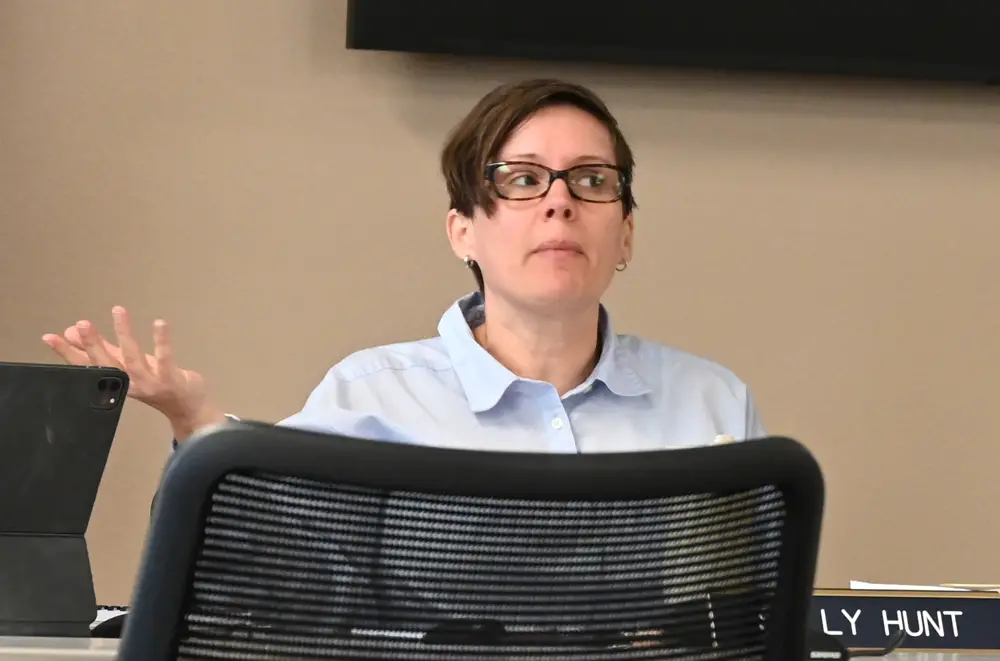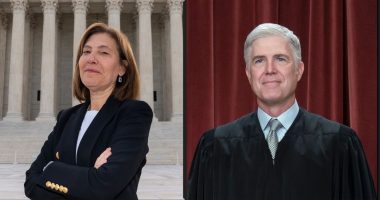
The Flagler County School Board’s Sally Hunt did not think that her list of causes to fire former Board attorney Kristy Gavin were the public’s business: she did not consider them a public record.
Hunt–who told a reporter she will not complete her term on the board–on Jan. 2, 5 and 10 turned in a list of causes to fire then-School Board Attorney Kristy Gavin. Fellow-Board member Christy Chong turned in a list of her own on Jan. 2.
The school board’s interim attorney, David Delaney, or the district, have yet to turn over either sets of emails despite numerous public record requests by FlaglerLive going back to Jan. 11. Delaney has also not responded to requests for his own email exchanges on public records with board members. He released the Chong list last week to Brad West, a resident who has been independently pursuing records related to the Gavin firing, but did not release the Hunt list to West, either. (See: “School Board’s Christy Chong’s ‘Cause’ Letter to Fire Attorney Is a Tissue of Fabrications, Petty Grievances and Cluelessness.”)
Gavin never received either list, until she read them either on FlaglerLive or in the Observer. Her termination letter was unaccompanied.
Hunt herself emailed her lists to the Observer, which reported on them today, even though she has been aware of the other public record requests, and herself gave the Observer her list. Hunt claimed that the list was sent to Shutts & Bowen, the law firm handling the Gavin firing on the board’s behalf, as “notes.” She told the Observer that “when she compiled the list she did not know it would be subject to public record requests,” the paper reported.
In fact, the document, combining Hunt’s lists and as published by the Observer in a Google Doc (available here as a pdf) adds up to four single-spaced pages of 10 grievances. Like Chong’s, the grievances mostly personal, gossipy or vague, but they are not mere “notes,” and if Hunt conveyed them to the law firm through emails, the emails themselves, even had they contained a frowny face, should have been provided in response to the public record requests.
Elected officials are instructed soon after their election that public records apply to all documents they generate in whatever form. Hunt had resisted releasing records previously, and required considerable pressure–ironically, from Gavin–to finally produce them. The release of one of those records is part of her list of causes.
Gavin was fired on Jan. 22, with about a year and a half left on her four-year contract. According to that contract, the board may fire her only for “just cause,” defined as “dereliction of duty, failure to report to work, misconduct in office or violation of criminal law.” Chong’s six causes do not appear to rise to that level, though it’ll be up to an administrative law judge, or a circuit court judge, to decide, should Gavin contest the firing. Board member Cheryl Massaro has warned repeatedly that the district would face a costly lawsuit.
Hunt’s causes repeat some of the same inaccuracies or falsehoods, and include several “causes” that are vague, unsupported by any evidence and unverifiable. Some of the inaccuracies are blatantly, verifiably false.
For example, under a charge of “misconduct,” Hunt claims Gavin made an “ageist” comment when she said that, in Hunt’s words, “30-somethings might apply for the superintendent role if the college degree requirement is too low (and that would be bad).” The parenthetical, in Hunt’s own text, was an assumption that a video of the meeting segment discredits.
Hunt is referring to a July 25 workshop when the board was discussing the job description of the superintendent. At the time, the board had not yet decided to hire appoint LaShakia Moore to the job permanently. The board was discussing years of experience and degree requirements. Gavin said: in that context: “The one thing I would say is if you were lowering it down to a bachelor’s degree, you may then want to increase the number of years of leadership and management, right? Because right now, it’s requiring 10 years of leadership, of ‘progressively responsible leadership management experience either as a school principal or central office management desirable.’ So if you’re only saying a bachelor’s degree, then you would potentially be looking at someone right now that’s 30 year old would be eligible.”
“That’s a good point,” Board member Will Furry said.
Hunt didn’t immediately refer to Gavin’s comment, first saying that the job description they were considering “oozes public school background” (a statement that could easily be taken as an insult by the district’s 1,600 public school employees). “Like if I’m from corporate, even though I’ve been in talent development, you know what I mean? I’m a fantastic leader, I am the person who’s going to get us the results we want, I’m not even going to apply if I don’t think even stand a chance,” Hunt said.
The board members and Gavin discussed degrees and other matters for three minutes. Hunt asked Moore if she had a master’s (“I had to have my master’s in order to be principal,” Moore told her). Gavin noted that prior, elected superintendents who were very well qualified but did not meet the administrative qualifications could still apply under the proposed description, thus opening up the pool to a broader spectrum of candidates.
Only then Hunt stated: “I just want to state for the record in case anybody’s listening, if someone is 30 years old and qualified because we are not ageist in this school district, then we would welcome them.”
“Yes, not at all,” Gavin says, as Furry laughed and Chong literally rolled her eyes–at Hunt’s claim.
“She can say whatever she wants, I did not make any ageist comment,” Gavin said today in an interview. She recalled the discussion, explaining the context. “That was just her trying to attack me.”
Under “dereliction of duty,” Hunt accuses Gavin of not providing proper counsel regarding Gavin’s conflict of interest when the board was discussing her contract. Again, the claim is verifiably false, as Gavin’s own statement to the board points in an opposite direction. “I supported their going and seeking outside counsel for an interpretation of my contract, so to say I didn’t tell them of a conflict, that’s not accurate,” she said.
Hunt repeats the false accusation that Gavin had “leaked” Hunt’s intention to move and leave the district to a FlaglerLive reporter. She had not: Hunt’s “leak” was more like a flood, judging from the number of people who had mentioned it to the reporter; Gavin was not among them. But the Observer’s Brent Woronoff was: she told him, too, for his article in today’s edition that she would be quitting, and had suggested as much in a workshop earlier this month. But she’s resigned before, only to reverse course.
Hunt repeats the false accusation that Gavin had led the reporter to a closed-door and seemingly illegal meeting of the school board following a news conference last August: the reporter had pressed Gavin to check on whether an illegal meeting was taking place, as, in fact, at least an inappropriate meeting was, even by Gavin’s judgment: she ended it.
Hunt also mischaracterizes events the same day, when Cheryl Massaro, who chaired the board at the time, addressed a heavily attended press conference about the scandal the district was dealing with at the beginning of the school year–two assemblies where Bunnell Elementary staff segregated, lectured and demeaned Black students, calling them a “problem,” in hopes of encouraging to do better on standardized tests. The scandal had drawn national attention and cost the school principal her job.
“I called Attorney Gavin with concerns about Cheryl going off-script during the Bunnell assembly press conference and using the word ‘segregation’ over and over,” Hunt wrote under “misconduct.” “Cherly left that conversation [with Gavin] with the idea that I was going to motion to censure her at an upcoming meeting.”
Hunt is referring to the meeting, also at least giving an appearance of impropriety, that the school board had before the press conference, out of public view, where then-public information officer Jason Wheeler explained the choreography of the coming press conference and Gavin distributed the statement she had drafted for Massaro to read, asking the board members if they were OK with it. “I handed her the prepared statement, I told her here, read this, this is the statement on behalf of the board,” Gavin said today. “I said to Ms. Hunt I didn’t think I needed to tell [Massaro] that was the statement on behalf of the board as it was written, because in the board procedure manual, when you’re speaking for the board as the chair, you don’t intermix your personal thoughts or ideas with the board’s ideas.”
It is open to question whether Gavin at that point should have solicited board members’ opinions about the statement in each other’s presence: they were dealing with board business, they were in what would be considered a closed-door meeting, they had no legal right to discuss the press conference ahead of time, nor the statement to be delivered. There could have been no agreement about the statement fostered in that room–not a legal one. Had there been one, the board members would have been in violation of the sunshine law.
In her statement to the press, Massaro almost immediately acknowledged: “They gave me a script. I’m going to read it. But you’re going to hear a little bit from me too, at the same time.” It wasn’t clear what part was off script. But the only part Hunt objected to was Massaro’s statement that “Flagler School Board does not support segregation. It hasn’t. Not this group, not for many, many, many years.” (Massaro did not, as Hunt claims, use the word “segregation” over and over. But it is far from the only instance where Hunt’s memory and verifiable facts about her claim do not match.)
Hunt was then upset that Gavin and Massaro both spoke to a FlaglerLive reporter about Hunt possibly calling for censuring Massaro–not a matter of “attorney-client,” as Hunt claimed, but a board conflict that revealed both Hunt’s misunderstanding of board members’ autonomy–though she always expects it for herself–and Hunt’s bizarre reaction to Massaro denouncing segregation. (See: “Sally Hunt Wanted to Censure School Board Chair For Going Off Script in Talk Over Segregated Assembly.”)
The grievances go on at times in a scattershot way, making the vaguest allegations (“Attorney Gavin has cited outdated information which leads to an appearance of ‘winging it,’” Hunt wrote under “dereliction of duty”) or the “misconduct” claim that an unnamed but “key member of the community” once told Hunt that Gavin had “shouted at him and his partners” and told them that “they are the people responsible for the murdering of students.” It isn’t clear why Hunt never mentioned the allegation before, or reported it. She also blamed Gavin for overstepping at meetings, or for not giving “unbiased” counsel: “She and Colleen Conklin have a 17+ year relationship working together and there are many appearances of Attorney Gavin’s loyalty to her,” Hunt wrote.
Responding to many such grievances, Gavin said: “I can’t comment on something that doesn’t have a specific instance attached to it.”










